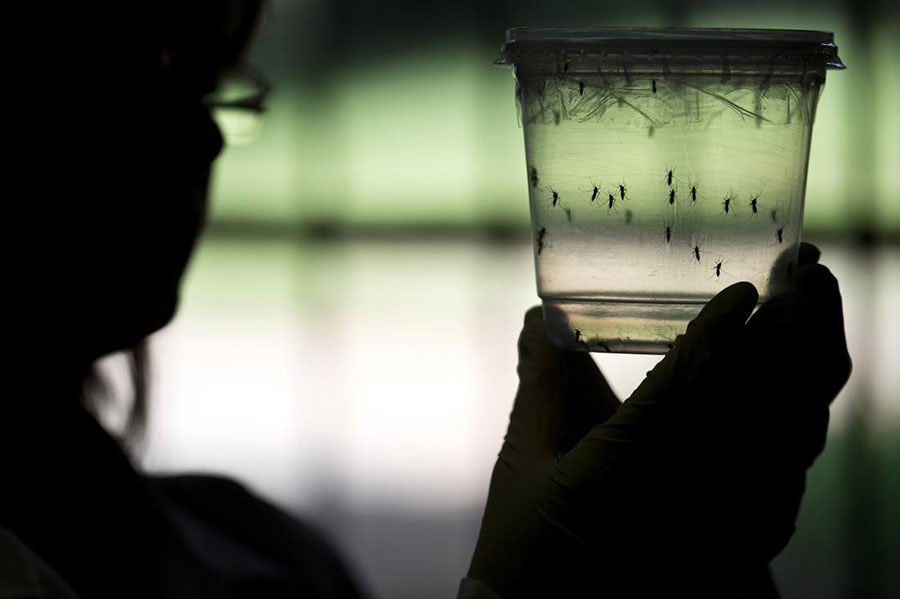French provider of vaccines Sanofi Pasteur has allied with the U.S. Army to develop a Zika vaccine candidate. Clinical trials have protected mice against the mosquito-borne disease, which has been linked with the development of microcephaly and neurological disorders in children.
Sanofi Pasteur confirmed on Wednesday it will work alongside the Walter Reed Army Institute of Research and Development (WRAIR). The U.S. Government will share its Zika vaccine technologies with the pharmaceutical company, to accelerate clinical strategies.

Sanofi will be in charge of producing clinical material to support a phase II trial, while WRAIR will provide data obtained by federal organizations such as the National Institute of Allergy and Infectious Diseases.
David Loew, executive VP of Sanofi Pasteur, said the new agreement will serve to enhance vaccine production against flaviviruses. The latter is responsible for Zika, dengue, and Japanese encephalitis.
“In addition to exploring our own vaccine technology used in our new dengue fever vaccine, we are looking at other pathways to get a Zika vaccine into the clinic as soon as possible. Therefore, this exciting collaboration with the WRAIR creates the opportunity to rapidly move forward,” said Loew.
Sanofi Pasteur is currently developing vaccines to treat dengue fever and Japanese encephalitis. Those viral diseases are transmitted by the same mosquito called Aedes aegypti. They could also share genetic similarities, said Sanofi in a press release issued on Wednesday.
Developing a Zika vaccine could take longer than expected. Pharmaceutical companies and institutions are jointly working to reduce the impact of the disease, which has extended all over South America, Central America, the Caribbean and Oceania.
U.S. Military: ‘A protective Zika virus vaccine for humans is feasible’
WRAIR said it is currently testing a “Zika Purified Inactivated Virus (ZPIV) vaccine candidate.” It has demonstrated effectiveness among mice and would meet standards determined by the U.S. Food and Drug Administration (FDA).
Sanofi would receive ZPIV technology to conduct larger tests, prior to manufacturing and production. Scientists at WRAIR contain biologic samples generated in human trials. The same team working on the Zika vaccine is working to develop an HIV vaccine.
The Beth Israel Deaconess Medical Center and Harvard Medical School are also collaborating with the U.S. Army. A study published this week in the journal Nature demonstrated that ZPIV has benefits to reduce the impact of Zika among mice.
Col. Nelson Michael said on Wednesday that preclinical investigations provide “early confidence” about a Zika vaccine for humans. The National Institute of Allergy and Infectious Diseases is already conducting regulations for human trials.
Army researchers team with Sanofi Pasteur to co-develop a Zika virus vaccine https://t.co/QuxvIze3QN @MHRPInfo @EurekAlertAAAS
— EurekAlert! (@EurekAlert) July 7, 2016
Researchers at WRAIR are expecting to start first human trials by late 2016. The institution said infectious diseases are a threat to members of the U.S. Service.
“The military has extensive expertise and capabilities to develop countermeasures. The WRAIR has been studying flaviviruses for over 100 years, since Walter Reed and his team discovered that yellow fever is transmitted by mosquitoes,” added Col. Michael.
Col. Thomas, who is also an infectious disease physician, said that WRAIR has been working on the Zika vaccine since a few years ago. Researchers at the institution had previously detected Zika outbreaks in Southeast Asia and French Polynesia, said the U.S. Army.
Col. Thomas added that it could take some years before federal institutions issue a license for producing the vaccine. However, it could take less than the usual ten years, as Zika infection is affecting millions of people worldwide.
ZIKA VIRUS
Days since White House funding request: 150
Funding response from Congress: $0
Zika cases in US and territories: 2,961
— Dan Diamond (@ddiamond) July 7, 2016
A committee of NIH researchers is going to Rio 2016 alongside athletes
In early February, the U.S. National Institutes of Health (NIH) announced an alliance with Brazil’s Butantan Institute, to develop a Zika vaccine. The World Health Organization (WHO) said the virus is responsible for causing birth defects and attacks to the nervous system.
The region most affected by Zika is Brazil, where the 2016 Olympic Games are going to take place. A committee of NIH researchers will monitor U.S. athletes attending to the Olympic and Paralympic games.
Catherine Spong, acting director of the National Institute of Child Health and Human Development, said monitoring the health of U.S. athletes is a great opportunity to “address and ongoing public health emergency.”
Should you be concerned about a Zika virus outbreak in the U.S.? https://t.co/LlEazgpekQ pic.twitter.com/IP4unXkbE9
— Forbes (@Forbes) July 7, 2016
The study wants to assess the incidence of the virus, and factors that trigger its transmission. The NIH said Zika virus infection symptoms do not usually manifest among adults. Researchers are also interested in evaluating asymptomatic infections.
All obtained data will be provided to the Centers for Disease Control and Prevention. The 2016 Olympic Games begin on August 5 in Rio de Janeiro. The Paralympic Games are set to take place on September 7 in the same city.
Some Athletes have removed the Olympic Games from their calendars, due to Zika infection concerns. The American cyclist, Tejay van Garderen, said he is not attending the event because his wife is pregnant.
Postponing, moving the Rio Games because of Zika would be unworthy of a medal. https://t.co/kFTUVb6YlQ (Photo: AP) pic.twitter.com/4djo2ymHjF
— USA TODAY (@USATODAY) July 7, 2016
Source: Sanofi Pasteur Press Release
